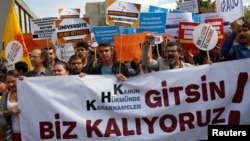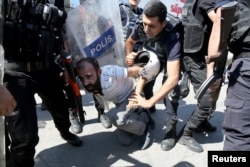The arrests of 24 Kurdish teachers, accused of supporting the PKK Kurdish rebel group, has intensified criticism of the Turkish government's use of the emergency powers it introduced following July's failed coup.
Early Sunday, loud banging on the door woke up the Dogan household. Heavily armed anti-terror police stormed into their apartment and arrested Gulizar Dogan, a teacher and a mother of two, including an eight-week-old baby.
At the door were five to six heavily armed police officers with their weapons drawn, said Gulizar Dogan's husband, Zeynel. A few other masked policemen stood behind with shields. Zeynel Dogan says he told the offciers to calm down, and they started beating him and asking this was the home of Gulizar Dogan.
Gulizar Dogan teaches art at a local high school in Diyarbakir, the largest city in Turkey's predominantly Kurdish southeast. She is among 24 teachers detained during the past few days under the same emergency powers that were used to suspend more than 11,000 teachers in the Kurdish region pending investigations for allegedly aiding terrorism. The government says it introduced emergency rule to track down those who were behind July's failed coup attempt.
‘Completely unlawful process’
The teacher's arrests are part of an alarming trend in the government's use of emergency powers, according to Sezgin Tanrikulu, a human rights lawyer and deputy leader of the main opposition Republican People's Party, the CHP.
“The dismissal of more than 11,000 teachers who had nothing to do with the coup attempt, and now the taking of teachers in custody in Diyarbakir, is a completely unlawful process against union-related activities,” he said.
The detained teachers are all reportedly union members who participated in a strike calling for a peaceful solution to the armed conflict between Turkey's government and the outlawed Kurdish PKK.
Turkey's largest teachers' union says the latest arrests represent a worrying escalation in the crackdown on its members.
Allegations of overreach
The CHP supported the introduction of emergency rule, but its leader, Kemal Kilicdaroglu, now accuses the government of using its powers to target opponents, rather than coup plotters. The CHP is challenging some of the emergency powers in Turkey's constitutional court.
The government insists it is determined to defeat what it calls the twin domestic threats of coup plotters and the PKK.
Human rights groups say the crackdown on the PKK is increasingly targeting members of Kurdish civil society, including locally elected officials of the People's Democratic Party, the HDP, Turkey's main pro-Kurdish party.
CHP deputy leader Tanrikulu says the sweeping powers of emergency rule are exacerbating the Turkish state's worst tendencies.
“This is a habit of this state since its beginning,” he said, “to associate all union activities or all oppositional stances against the government with membership in secret organizations or terrorist organizations.”
Under emergency rule, the detained teachers can be denied access to their families or lawyers for up to 30 days. But Gulizar Dogan, nursing her eight-week-old baby, is being allowed daily access to feed her child.





